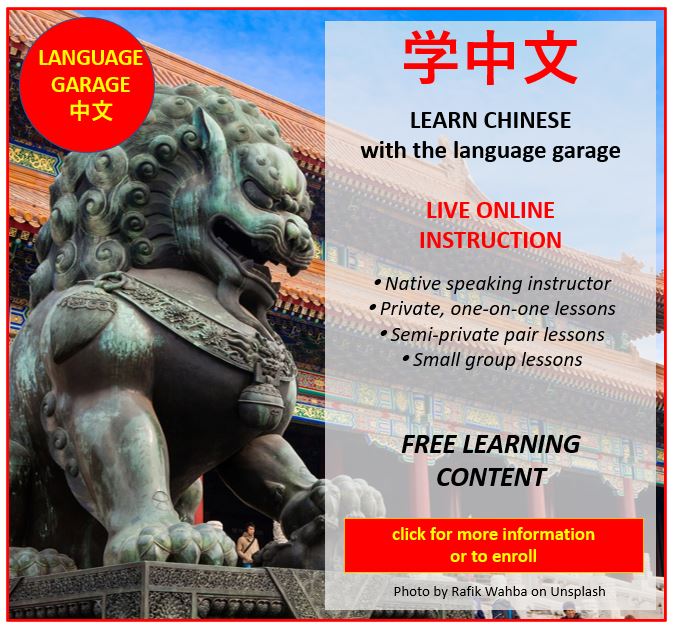Image: StockSnap on Pixabay
In this post we’ll look at lots of action verbs that will come in handy when you’re talking everyday life.
你要去哪儿? Nǐ yào qù nǎr ? Where are you going?
Let’s start with a bunch of verbs to talking about coming and going: 去(步行、开车) qù (bù xíng, kāi chē) to go (on foot, by car); 走路 zǒu lù to walk; 来 lái to come, 离开 lí kāi to leave; 到达 dào dá to arrive; 出去 chū qù to go out; 进入 jìn rù to enter.
- 我开车去上班。我步行去上班。
Wǒ kāi chē qù shàng bān. Wǒ bù xíng qù shàng bān.
I go to work by car. I go to work on foot. - 我们每个星期天都在公园散步。
Wǒmen měi gè xīng qī tiān dōu zài gōng yuán sàn bù.
We walk in the park every Sunday.
- 这个周末谁会来参加这个聚会?
Zhè gè zhōu mò shuí huì lái cān jiā zhè gè jù huì ?
Who’s coming to the party this weekend? - 我通常很晚才下班。
Wǒ tōng cháng hěn wǎn cái xià bān.
I usually leave work late. - 火车上午10点到达。
Huǒchē shàng wǔ shí diǎn dào dá.
The train arrives at 10am. - 我和朋友出去。
Wǒ hé péngyou chū qù.
I go out with my friends. - 我晚上从不去公园。
Wǒ wǎnshang cóng bù qù gōng yuán.
I never go in the park at night.
你什么时候起床? Nǐ shén me shí hou qǐchuáng? What time do you get up?
Now let’s see some verbs that you can use to talk about your daily routine: 起床 qǐchuáng to get up, 醒 xǐng to wake up; 洗澡 xǐ zǎo to take a shower; 泡澡 pào zǎo to take a bath; 穿上衣服 chuān shàng yīfu to get dressed; 穿上衬衫 chuān shàng chèn shān to put on a shirt; 脱衣服 tuō yīfu to get undressed; 脱裤子 tuō kùzi to take off pants; 刷牙 shuā yá to brush your teeth; 洗手 xǐ shǒu to wash your hands; 吃早餐/午饭/晚饭 chī zǎo cān / wǔ fàn / wǎn fàn to have breakfast/lunch/dinner; 上床睡觉 shàng chuáng shuì jiào to go to bed; 睡觉 shuì jiào to sleep.
- 我工作时间会早起,周末会晚起。
Wǒ gōng zuò shí jiān huì zǎo qǐ, zhōu mò huì wǎn qǐ.
I wake up early during the week, and l wake up late on the weekend. - 我总是早上洗澡。我从不泡澡。
Wǒ zǒng shì zǎoshang xǐ zǎo. Wǒ cóng bù pào zǎo.
I always take a shower in the morning. I never take a bath. - 我可以很快穿好衣服。
Wǒ kě yǐ hěn kuài chuān hǎo yīfu.
I get dressed quickly. - 天冷时她会穿上毛衣。
Tiān lěng shí tā huì chuān shàng máo yī.
She puts on a sweater when it’s cold. - 我会在睡觉前脱掉衣服。
Wǒ huì zài shuì jiào qián tuō diào yīfu.
I get undressed before bed. - 他在屋里要脱下鞋子。
Tā zài wū lǐ yào tuō xià xié zi.
He takes off his shoes in the house. - 我饭后刷牙。
Wǒ fàn hòu shuā yá.
I brush my teeth after I eat. - 我饭前洗手。
Wǒ fàn qián xǐ shǒu.
I wash my hands before I eat. - 你通常什么时候睡觉?
Nǐ tōng cháng shén me shí hou shuì jiào?
What time do you usually go to bed? - 你通常睡几个小时?
Nǐ tōng cháng shuì jǐ gè xiǎo shí?
How many hours do you usually sleep?
他说了很多。 Tā shuō le hěn duō. He talks a lot.
Here are several general verbs that you can use in daily life. 讲话 jiǎng huà to speak; 说话 shuō huà to talk; 说 shuō to say; 明白 míngbai to understand; 学习 xué xí to learn, to study; 给 gěi to give; 做 zuò to make; 拿 ná to take; 问 wèn to ask; 回答 huí dá to answer; 打开 dǎ kāi to open; 关闭 guān bì to close; 用 yòng to use; 接 jiē to pick up; 放 fàng to put.
- 你会说几种语言?
Nǐ huì shuō jǐ zhǒng yǔ yán?
How many languages do you speak? - 我每天都和朋友聊天。
Wǒ měi tiān dōu hé péngyou liáo tiān.
I talk with my friends every day. - 她在说什么?我不明白。
Tā zài shuō shén me ? Wǒ bù míngbai.
What is she saying? I don’t understand. - 孩子们在学校可以学到很多东西。
Háizi men zài xué xiào kě yǐ xué dào hěn duō dōngxi.
Children learn a lot in school. - 你在大学里学什么?
Nǐ zài dàxué lǐ xué shénme ?
What do you study at university? - 我在朋友生日那天送给她一件礼物。
Wǒ zài péngyou shēng rì nà tiān sòng gěi tā yī jiàn lǐ wù.
I give my friend a present on her birthday. - 孩子们给父母做了礼物。
Háizi men gěi fù mǔ zuò le lǐ wù.
The children make gifts for their parents. - 你早上坐地铁还是公共汽车?
Nǐ zǎoshang zuò dì tiě huái shì gōng gòng qì chē?
Do you take the train or the bus in the morning? - 孩子们问了很多问题。
Háizi men wèn le hěn duō wèn tí.
Children ask a lot of questions. - 老师回答问题。
Lǎo shī huí dá wèn tí.
The teacher answers questions. - 她打开门。
Tā dǎ kāi mén.
She opens the door. - 他关上门。
Tā guān shàng mén.
He closes the door. - 你用笔还是铅笔?
Nǐ yòng bǐ huái shì qiān bǐ?
Do you use a pen or a pencil? - 我去拿我的包。
Wǒ qù ná wǒ de bāo.
I pick up my bags. - 我通常把钥匙放在抽屉里。
Wǒ tōng cháng bǎ yàoshi fàng zài chōuti lǐ.
I usually put my keys in a drawer.
你在吃什么? Nǐ zài chī shén me ? What are you eating?
Now let’s look at some verbs that you can use to talk about typical situations at home: 吃 chī to eat; 喝 hē to drink; 做饭 zuò fàn to cook; 打算 dǎ suàn to clean; 洗碗 xǐ wǎn to do the dishes; 洗衣服 xǐ yīfu to do the laundry; 收拾盘子 shōushi pánzi to put away the dishes; 看电视 kàn diàn shì to watch TV; 听音乐 tīng yīn yuè to listen to music; 阅读 yuè dú to read; 放松 fàng sōng to relax; 躺下 tǎng xià to lie down; 坐下 zuò xià to sit down; 站起来 zhàn qǐ lái to stand up.
- 我吃很多米饭。
Wǒ chī hěn duō mǐ fàn.
I eat a lot of rice. - 你早上喝茶还是喝咖啡?
Nǐ zǎoshang hē chá huái shì hē kā fēi ?
Do you drink tea or coffee in the morning? - 你做饭做得很好吃!
Nǐ zuò fàn zuò dé hěn hǎo chī!
You cook very well! - 我周六打扫我的公寓。
Wǒ zhōu liù dǎ sǎo wǒ de gōng yù.
I clean my apartment on Saturdays. - 我们每天晚上洗碗。
Wǒmen měi tiān wǎnshang xǐ wǎn.
We do dishes every evening. - 他星期天洗衣服。
Tā xīng qī tiān xǐ yī fu.
He does laundry on Sundays. - 盘子洗干净后我们就把它们收起来。
Pánzi xǐ gān jìng hòu wǒ men jiù bǎ tāmen shōu qǐ lái.
We put the dishes away when they are clean. - 你每天晚上看电视吗?
Nǐ měi tiān wǎnshang kàn diàn shì ma?
Do you watch TV every evening? - 我每天听音乐。
Wǒ měi tiān tīng yīn yuè.
I listen to music every day. - 我每晚在床上看书。
Wǒ měi wǎn zài chuáng shàng kàn shū.
I read every night in bed. - 我们每个周末都放松一下。
Wǒmen měi gè zhōu mò dōu fàng sōng yī xià.
We relax every weekend. - 我下午会躺一会儿。
Wǒ xià wǔ huì tǎng yī huìr.
I lie down in the afternoon. - 我们坐在客厅里。
Wǒmen zuò zài kè tīng lǐ.
We sit down in the living room. - 他站起来离开了房间。
Tā zhàn qǐ lái lí kāi le fáng jiān.
He stands up and leaves the room.
我在买吃的东西。 Wǒ zài mǎi chī de dōng xī. I’m buying food.
Here are some common verbs related to shopping: 买 mǎi to buy; 去购物 qù gòu wù to go shopping; 找 zhǎo to look for; 找到 zhǎo dào to find; 付钱 fù qián to pay; 花费huā fèi to cost; 试穿shì chuān to try on; 花钱 huā qián to spend money; 从自动取款机取钱 cóng zì dòng qǔ kuǎn jī qǔ qián to withdraw money from an ATM; 省钱 shěng qián to save money.
- 我们在超市购买食物。
Wǒmen zài chāo shì gòu mǎi shí wù.
We buy food at the supermarket. - 我们每个周末都去购物。
Wǒmen měi gè zhōu mò dōu qù gòu wù.
We go shopping every weekend. - 我在找一双新鞋。
Wǒ zài zhǎo yī shuāng xīn xié.
I’m look for a new pair of shoes. - 他总是可以在这家商店里发现有趣的东西。
Tā zǒng shì kě yǐ zài zhè jiā shāng diàn lǐ fā xiàn yǒu qù de dōngxi.
He always finds something interesting in this store. - 你用现金还是信用卡支付?
Nǐ yòng xiàn jīn huái shì xìn yòng qiǎ zhī fù ?
Do you pay by cash or credit card? - 那要多少钱?
Nà yào duō shǎo qián?
How much does that cost? - 我总是在买衣服之前试穿一下。
Wǒ zǒng shì zài mǎi yī fu zhī qián shì chuān yī xià.
I always try on clothes before I buy them. - 她在书上花了很多钱。
Tā zài shū shàng huā le hěn duō qián.
She spends a lot of money on books. - 我在自动取款机上取钱。
Wǒ zài zì dòng qǔ kuǎn jī shàng qǔ qián.
I’m taking money out at the ATM. - 我从不存钱,因为所有东西都很贵。
Wǒ cóng bù cún qián, yīn wèi suǒ yǒu dōngxi dōu hěn guì.
I never save money because everything is so expensive.
你在哪里工作? Nǐ zài nǎ lǐ gōng zuò? Where do you work?
Now let’s look at some common verbs you can use at work: 工作 gōng zuò to work; 开始 kāi shǐ to start; 结束 jié shù to end; 写 xiě to write; 打电话 dǎ diàn huà to call (on phone); 发送电子邮件 fā sòng diàn zǐ yóu jiàn to send an email; 收到电子邮件 shōu dào diàn zǐ yóu jiàn to get an email; 休息一下 xiūxi yī xià to take a break; 开会 kāi huì to have a meeting; 讨论 tǎo lùn to discuss.
- 我在周一、周二、周三、周四和周五工作。我星期六和星期天不工作。
Wǒ zài zhōu yī, zhōu èr, zhōu sān, zhōu sì hé zhōu wǔ gōng zuò. Wǒ xīng qī liù hé xīng qī tiān bù gōng zuò.
I work on Mondays, Tuesdays, Wednesdays, Thursdays, and Fridays. I don’t work on Saturdays and Sundays. - 会议每周一上午10点开始。
Huì yì měi zhōu yī shàng wǔ shí diǎn kāi shǐ.
The meeting starts every Monday at 10am. - 会议什么时候结束?
Huì yì shén me shí hou jié shù ?
What time does the meeting end? - 他写了很多报告。
Tā xiě le hěn duō bào gào.
He writes a lot of reports. - 我给客户打电话。
Wǒ gěi kè hù dǎ diàn huà.
I call my clients on the phone. - 她发了很多电子邮件。
Tā fā le hěn duō diàn zǐ yóu jiàn.
She sends a lot of emails. - 她收到很多电子邮件。
Tā shōu dào hěn duō diàn zǐ yóu jiàn.
She receives a lot of emails. - 我一般下午会休息一下,喝点儿咖啡。
Wǒ yī bān xià wǔ huì xiūxi yī xià, hē diǎnr kā fēi.
I take a break in the afternoon and drink some coffee. - 我们有很多会议。
Wǒmen yǒu hěn duō huì yì.
We have a lot of meetings. - 他们在会议上讨论什么?
Tāmen zài huì yì shàng tǎo lùn shén me ?
What do they discuss in the meetings?
我们玩儿得很开心! Wǒmen wánr de hěn kāi xīn! We’re having a good time!
Now that we’ve gotten work out the way, let’s see some verbs that you can use for your free time: 希望你们玩得开心/玩得开心 xīwàng nǐmen wánr de kāi xīn / wánr de kāi xīn to have a good time/to enjoy yourself; 跳舞 tiào wǔ to dance; 唱歌 chàng gē to sing; 微笑 wēi xiào to smile; 笑 xiào to laugh, 解决 jiě jué to work out; 游泳 yóu yǒng to swim; 跑 pǎo to run; 做运动 zuò yùn dòng to play (a sport); 演奏 yǎn zòu to play (a musical instrument); 跳 tiào to jump; 登 dēng to climb; 爬 pá to crawl; 骑车 qí chē to bike; 开车 kāi chē to drive; 扔 rēng to throw; 抓住 zhuā zhù to catch.
- 我和朋友总是玩儿得很开心。
Wǒ hé péngyou zǒng shì wánr de hěn kāi xīn.
I always have a good time with my friends. - 我们每个周末都去夜总会跳舞。
Wǒmen měi gè zhōu mò dōu qù yè zǒng huì tiào wǔ.
We go to nightclubs and dance every weekend. - 她唱得真好!
Tā chàng de zhēn hǎo!
She sings really well! - 他总是微笑着。他从不难过。
Tā zǒng shì wēi xiào zhe. Tā cóng bù nán guò.
He always smiles. He’s never sad. - 他们在一起时会开心地笑。
Tāmen zài yī qǐ shí huì kāi xīn de xiào.
They laugh when they’re together. - 我每周锻炼四五天。
Wǒ měi zhōu duàn liàn sì wǔ tiān.
I work out four or five days a week. - 你是在游泳池里还是在湖里游泳?
Nǐ shì zài yóu yǒng chí lǐ huái shì zài hú lǐ yóu yǒng?
Do you swim in a pool or in a lake? - 孩子们在操场上跑步。
Háizi men zài cāo chǎng shàng pǎo bù.
The children run in the playground. - 我们打棒球/打篮球/踢足球。
Wǒmen dǎ bàng qiú / dǎ lán qiú / tī zú qiú.
We play baseball/basketball/soccer. - 我会弹钢琴/吹小号/拉小提琴。
Wǒ huì tán gāng qín / chuī xiǎo hào / lā xiǎo tí qín.
I play piano/trumpet/violin. - 男孩儿们蹦跳到床上。
Nán háir men bèng tiào dào chuáng shàng.
The boys jump on the bed. - 女孩儿们爬树。
Nǚ háir men pá shù.
The girls climb trees. - 那个婴儿在地板上爬。
Nà gè yīng ér zài dì bǎn shàng pá.
The baby crawls on the floor. - 我们每个周末都去公园骑车。
Wǒ men měi gè zhōu mò dōu qù gōng yuán qí chē.
We bike every weekend in the park. - 我每天开车上班。
Wǒ měi tiān kāi chē shàng bān.
I drive to work every day. - 男孩儿扔球。
Nán háir rēng qiú.
The boy throws the ball. - 女孩儿接球。
Nǚ háir jiē qiú.
The girl catches the ball.
我闻到了什么。 Wǒ wén dào le shén me. I smell something.
Here are a few verbs related to the senses: 闻 wén to smell; 听到 tīng dào to hear; 看到 kàn dào to see; 品尝 pǐn cháng to taste; 摸 mō to touch; 感觉 gǎn jué to feel; 好像 hǎo xiàng to seem/appear; 想 xiǎng to think; 相信 xiāng xìn to believe; 知道 zhī dào to know; 认识一个人 rèn shì yī gè rén to know a person.
- 我们闻到了新鲜面包的味道。
Wǒmen wén dào le xīn xiān miàn bāo de wèi dào.
We smell fresh bread. - 这朵花闻起来真香!
Zhè duǒ huār wén qǐ lái zhēn xiāng!
This flower smells really nice! - 这孩子看到什么都摸一摸。
Zhè hái zi kàn dào shén me dōu mō yī mō.
The child touches everything he sees. - 你听到鸟叫声了吗?
Nǐ tīng dào niǎo jiào shēng le ma?
Do you hear the birds? - 你看见那边那位女士了吗?
Nǐ kàn jiàn nà biān nà wèi nǚ shì le ma?
Do you see the woman over there? - 我做饭时总是要尝一下做的食物。
Wǒ zuò fàn shí zǒng shì yào cháng yī xià zuò de shí wù.
I always taste food while I cook. - 这汤味道好极了。
Zhè tāng wèi dào hǎo jí le.
This soup tastes good. - 你今天感觉怎么样?
Nǐ jīn tiān gǎn jué zěn me yàng?
How do you feel today? - 她好像有些不高兴。
Tā hǎo xiàng yǒu xiē bù gāoxìng.
She seems unhappy about something. - 你在想什么?
Nǐ zài xiǎng shén me?
What are you thinking about? - 你相信他的解释吗?
Nǐ xiāng xìn tā de jiě shì ma ?
Do you believe his explanation? - 那是什么?我不知道。
Nà shì shén me? Wǒ bù zhī dào.
What is that? I don’t know. - 我认识他妹妹。
Wǒ rèn shì tā mèi mèi.
I know his sister.
我听不见你! Wǒ tīng bù jiàn nǐ! I can’t hear you!
Now let’s look at a few modals and types of verbs that you can combine with other verbs: 能做 néng zuò can do; 知道怎么做 zhī dào zěn me zuò know how to do; 必须做/不得不做must do/have to do; 想做 xiǎng zuò want to do; 需要做xū yào zuò need to do; 开始做 kāi shǐ zuò start doing; 停止做 tíng zhǐ zuò stop doing; 继续做jì xù zuò continue/keep doing.
- 你能看电视吗?
Nǐ néng kàn diàn shì ma?
Can you see the television? - 你会弹吉他吗?
Nǐ huì tán jí tā ma?
Do you know how to play guitar? - 我明天得工作。
Wǒ míng tiān děi gōng zuò.
I have to work tomorrow. - 你今晚想做什么?
Nǐ jīn wǎn xiǎng zuò shén me?
What do you want to do tonight? - 我要学习。我明天有考试。
Wǒ yào xué xí. Wǒ míng tiān yǒu kǎo shì.
I need to study. I have a test tomorrow. - 我们一大早就开始工作了。
Wǒmen yī dà zǎo jiù kāi shǐ gōng zuò le.
We start working early in the morning. - 我看书看到半夜,然后上床睡觉。
Wǒ kàn shū kàn dào bàn yè, ránhòu shàng chuáng shuì jiào.
I stop reading at midnight and go to bed. - 他们看电影的时候一直在说话。
Tāmen kàn diàn yǐng de shíhou yī zhí zài shuō huà.
They keep talking during the movie.
Do you want to learn Chinese?
Check out our other posts on Chinese language, culture, and more. And if you’re looking for convenient and affordable live Chinese lessons with a real teacher, check out The Language Garage. Our lessons are given online in a virtual classroom, so it doesn’t matter where you live or work – we can come to you. And we have flexible options, with a free trial so that you can decide if there’s a fit. Check us out!





